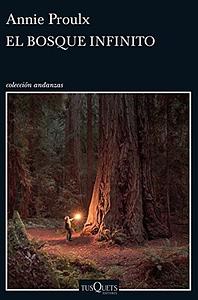You need to sign in or sign up before continuing.
Take a photo of a barcode or cover
Such a hard going book, but kept at it, it gets better. It covers years and years, and switches between people (families/descendants), and ca be hard to know who is who or what they are doing. The last bit from Lavinia onwards is fantastic. Love the growing interest in planting to replace trees logged, and growing awareness of ecology.
owing to Ms Proulx amazing contributions to my past reading enjoyment i gave this book a much longer trial than i would have any other author. but, in the end, actually 100+ pages, i had to call it quits. i just couldn't. there was nothing in this tome of what i go to Ms Proulx for in my reading. in fact, had someone given me this book and asked me if i could guess the author from just reading what i did, i would be hard pressed to attribute it to her. this book is so different in style from everything else i've read by her that it's hard to believe it's her work. this makes me very, very sad.
Beautifully written and well researched. Could have been about 200 pages shorter. If I didn't have ancestors from Quebec I may not have finished the book, but I did find it fulfilling to get a real sense of what life was like from the perspective of the settlers in that region in the 1700s. I also really enjoyed the author's viewpoint on the deforestation that occurred during this time and the forest management practices in Europe. Helpful environment perspective.
Probably the most depressing book I've ever read. It really encompasses the whole "life's a bitch and then you die," mentality. If you're looking to feel more shame and anger and hopelessness about deforestation and the decline, evils, and ignorance of humanity, then golly gee wilikers, this book is for you.
One of my favorite books of the year--the generational storytelling made for beautiful intersections and comparisons between the different families. The historical research that went into this was so impressive, I felt like I had a real sense of what it meant to struggle through life in Canada and America in the early 18th and 19th centuries (both for white settlers and indigenous people). The ending left me with a tiny bit of hope but mostly despair, looking at the mindset of those trying to protect the tiny bit of forest that was left and their realization that they'll never know even a fraction of the knowledge and life that was there before white people came and began to destroy it--but their determination to at least do what they could to protect and regrow what they could.
Don't let the page number dissuade you, I read this in less than two weeks. It's an incredible saga.
Don't let the page number dissuade you, I read this in less than two weeks. It's an incredible saga.
Absorbing, harrowing, intensely disturbing, and enlightening. I wish she had fleshed out some of the characters more, especially the women.
Excellent. The only disappointment is that the men are so much more fleshed out than the women. Even the two who are integral to the tale seem to be painted in broad strokes of alienness, and we are not invited to meet their inner selves are we are to those of the male characters.
Barkskins begins with two poor young Frenchmen, Duquet and Sel, arriving in New France (Canada). They are forced to work for three years in exchange for their own land to eventually settle on. They are blown away over how wild the new world is and the seemingly infinite amount of huge trees that stretch for as far as the eye can see. In the rest of this epic novel we get to know their decedents over 300 years and witness the deforestation of North America due the insatiable appetite for wood of the growing continent along with the ever increasing demand from Europe. Also, we read of the native peoples were cast aside and exploited for cheap labor and the ravaging of the animal population for food and fur. This was a brutal time. Work was physically hard and accidents and sickness took a lot of lives at young ages. As we move through the novel to modern times, the messages start to transition a bit towards ecology and preservation rather than pure exploitation.
I found this book to be hard to put down. The author describes the settings beautifully, and logging processes and living conditions in great detail and you feel like you are back in time. The novel feels like a series of short stories or novellas as we skip from one generation to the next, and alternate between the Duquet and Sel families. And even though we didn't spend an inordinate amount of time with any one character, I felt like I knew many of them. Portions of the book were set in Europe, China, and New Zealand as well. The scope of this novel is massive and the author must've done a lot of research in a number of subjects such as logging, economics, native cultures, and everything in between dating back to the 1600s.
I did the double dip on this - I own the massive paperback and also listened on Audible. Luckily there were detailed family trees of the Duquets and Sels in both formats. I was constantly flipping back to remind myself who was related to who. The audiobook was narrated by Robert Petkoff who did a great job with the many voices and dialects. This is the first book by Proulx I've read and am interested in reading more, her writing was fantastic.
While reading, I couldn't help but wonder what the US and Canada where the book was set looked like in the 17th and 18th centuries. I've seen old-timey pictures of the Minnesota Big Woods in which tree trunks were unimaginably large. We'll never see anything like that ever again. It's sad but these resources built the cities and houses we live in, and hopefully with the knowledge of the importance of trees and forests in regards to our current climate issues the wave of conservation will continue to gain momentum.
Five stars. I'm guessing this will be in my top five of 2021, possibly in the top slot.
I found this book to be hard to put down. The author describes the settings beautifully, and logging processes and living conditions in great detail and you feel like you are back in time. The novel feels like a series of short stories or novellas as we skip from one generation to the next, and alternate between the Duquet and Sel families. And even though we didn't spend an inordinate amount of time with any one character, I felt like I knew many of them. Portions of the book were set in Europe, China, and New Zealand as well. The scope of this novel is massive and the author must've done a lot of research in a number of subjects such as logging, economics, native cultures, and everything in between dating back to the 1600s.
I did the double dip on this - I own the massive paperback and also listened on Audible. Luckily there were detailed family trees of the Duquets and Sels in both formats. I was constantly flipping back to remind myself who was related to who. The audiobook was narrated by Robert Petkoff who did a great job with the many voices and dialects. This is the first book by Proulx I've read and am interested in reading more, her writing was fantastic.
While reading, I couldn't help but wonder what the US and Canada where the book was set looked like in the 17th and 18th centuries. I've seen old-timey pictures of the Minnesota Big Woods in which tree trunks were unimaginably large. We'll never see anything like that ever again. It's sad but these resources built the cities and houses we live in, and hopefully with the knowledge of the importance of trees and forests in regards to our current climate issues the wave of conservation will continue to gain momentum.
Five stars. I'm guessing this will be in my top five of 2021, possibly in the top slot.
wavering between 3 and 4 stars. 3 ½-stars.
i've been trying to figure out what to say about this book since finishing it last night, and i can't quite sort it out in my head. at times, while reading, i was completely caught up and immersed in the story. but at other times, i felt like the book was lagging under its own weight and importance. for the breadth of the novel, the depth was often shallower than i expected from proulx, especially given the meaty 700+ page count. certainly, i could tell barkskins was a passion project for proulx (alliteration unintentional) - the research covered so many subjects, over such a span of time. apparently, it took nearly 15 years for this book to reach us. so i have great respect for proulx and this project. and yet... i did not love the book as much as i had hoped/wanted to.
what i really liked:
• the structure, following the two bloodlines of rené sel and charles duquet (later, duke). the two men were brought to new france as part of the seigneurial system shenanigans. as indentured labourers (woodcutters, in this case), the habitants would come into their own land after several years of work and poor treatment. sel's line joins with that of the mi'kmaq people and their difficult histories. duquet's story begins what will become an american logging empire.
• the characters were not at all difficult to follow - each was so distinct and well crafted. though there are a lot of them - how could there not be over 300 years of families? - family trees are included.
• how attached i became to some of the characters
• the environmental theme, and settings in new france, the US, europe and new zealand. place as character is something i really get into when reading fiction and proulx brings her settings alive so completely.
and for as much as the moments i really enjoyed, these are where things went slightly sideways for me:
• i was disappointed over how some of the storylines just fell away or felt unresolved, though sometimes proulx gives readers some gruesome demises.
• the proselytizing was sometimes heavy-handed (and i am already inclined to share proulx's worries and frustrations).
• the ending felt odd and a little abrupt to me. had the family lines - after the 'what's going to happen?' intrigue was so built up - come together once again for a juicy dénouement, that would have been super-satisfying.
• the previously mentioned lack of depth.
often, with writers we strongly favour, we are prepared to make allowances or overlook clunkiness when things wobble a bit. but i find the this trickier to do when there is time and the space within a book.
but, having said all of this and, perhaps, sounding like an negative nellie (sorry!!) i did enjoy the book, and hope you will read it too. it just was not the blow-me-down 5-star read i had hoped for. though i realize the fault may be all mine and this a case of not keeping expectations in check.
i've been trying to figure out what to say about this book since finishing it last night, and i can't quite sort it out in my head. at times, while reading, i was completely caught up and immersed in the story. but at other times, i felt like the book was lagging under its own weight and importance. for the breadth of the novel, the depth was often shallower than i expected from proulx, especially given the meaty 700+ page count. certainly, i could tell barkskins was a passion project for proulx (alliteration unintentional) - the research covered so many subjects, over such a span of time. apparently, it took nearly 15 years for this book to reach us. so i have great respect for proulx and this project. and yet... i did not love the book as much as i had hoped/wanted to.
what i really liked:
• the structure, following the two bloodlines of rené sel and charles duquet (later, duke). the two men were brought to new france as part of the seigneurial system shenanigans. as indentured labourers (woodcutters, in this case), the habitants would come into their own land after several years of work and poor treatment. sel's line joins with that of the mi'kmaq people and their difficult histories. duquet's story begins what will become an american logging empire.
• the characters were not at all difficult to follow - each was so distinct and well crafted. though there are a lot of them - how could there not be over 300 years of families? - family trees are included.
• how attached i became to some of the characters
• the environmental theme, and settings in new france, the US, europe and new zealand. place as character is something i really get into when reading fiction and proulx brings her settings alive so completely.
and for as much as the moments i really enjoyed, these are where things went slightly sideways for me:
• i was disappointed over how some of the storylines just fell away or felt unresolved, though sometimes proulx gives readers some gruesome demises.
• the proselytizing was sometimes heavy-handed (and i am already inclined to share proulx's worries and frustrations).
• the ending felt odd and a little abrupt to me. had the family lines - after the 'what's going to happen?' intrigue was so built up - come together once again for a juicy dénouement, that would have been super-satisfying.
• the previously mentioned lack of depth.
often, with writers we strongly favour, we are prepared to make allowances or overlook clunkiness when things wobble a bit. but i find the this trickier to do when there is time and the space within a book.
but, having said all of this and, perhaps, sounding like an negative nellie (sorry!!) i did enjoy the book, and hope you will read it too. it just was not the blow-me-down 5-star read i had hoped for. though i realize the fault may be all mine and this a case of not keeping expectations in check.
Not a gripping read but beautifully written. I agree with most of the long reviews ahead of me. Worth the time invested.
As an aside, all my known ancestors came down into New England from Quebec so I found the first part interesting. The alcoholism and abusive behavior was still present when I grew up in the 1950s.
As an aside, all my known ancestors came down into New England from Quebec so I found the first part interesting. The alcoholism and abusive behavior was still present when I grew up in the 1950s.





